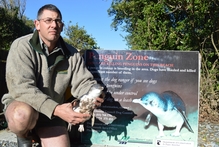Tuesday May 28, 2013

DOC biodiversity programme manager Brad Edwards with a dead
penguin. The sign was installed today after the third death in a
fortnight. Photo / Greymouth Star
The Grey District Council today warned that anyone walking their dog off the lead on the cycle trail could be hit with a $300 infringement notice.
A penguin was mauled to death by a dog overnight, and two others were killed in the past fortnight.
The Department of Conservation today found two adult birds unharmed in a burrow by the Karoro Domain, but a third was dead and bloodied on the cycleway.
Autopsies confirmed the other two recent attacks were by dogs, and DOC biodiversity programme manager Brad Edwards said a roaming dog appeared to have been responsible for the death last night.
Council animal control officer Murray Malloch said dog control staff would be policing the cycleway in future to ensure dogs were being kept on leads. Owners who let their dogs run free could be slapped with an infringement notice.
"We will pick portions (of the track) to police," he said.
Mr Edwards said the penguins were returning to their nests before breeding. In the worst case scenario, a bird would be killed, leaving the chicks or eggs to die, stopping the colony from reproducing that year.
"It brings the entire colony at Karoro under threat.
"Don't let your dogs roam at night."
Mayor Tony Kokshoorn, who lives close to the Karoro beach, said that about five years ago his family often saw 18 or 20 birds on the beach at the mouth of Watsons Creek.
Since the cycleway had gone in, the penguin environment had changed and there were now "half a dozen, at most".
"You can still hear them at night," he said, but from his observations the colony appeared to be under threat.
source


















No comments:
Post a Comment